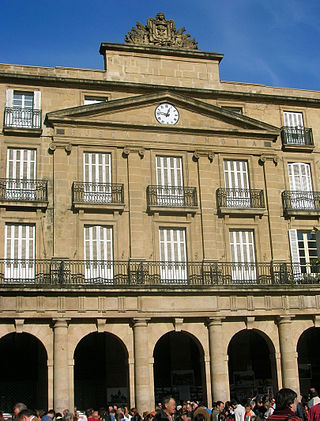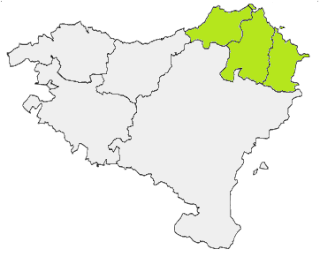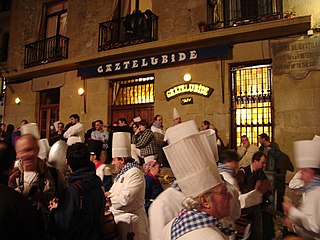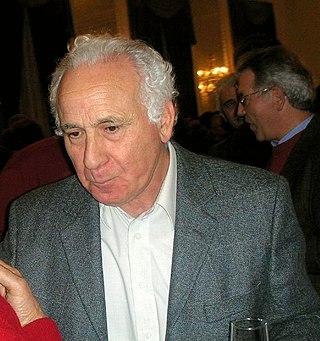
Dominique Joseph Garat was a French Basque writer, lawyer, journalist, philosopher and politician.

Jean-Baptiste Cavaignac was a French politician and statesman.

Basque music refers to the music made in the Basque Country, reflecting traits related to its society/tradition, and devised by people from that territory. While traditionally more closely associated to rural based and Basque language music, the growing diversification of its production during the last decades has tipped the scale in favour of a broad definition.

The Basque Country is the name given to the home of the Basque people. The Basque Country is located in the western Pyrenees, straddling the border between France and Spain on the coast of the Bay of Biscay.

Euskaltzaindia is the official academic language regulatory institution which watches over the Basque language. It conducts research, seeks to protect the language, and establishes standards of use. It is known in Spanish as La Real Academia de la Lengua Vasca and in French as Académie de la Langue Basque.
Communist Movement of Euskadi was originally the branch of the Communist Movement (MC) in Basque Country and Navarre, Spain. EMK was previously known as ETA Berri, a splinter group of ETA. EMK separated itself from MC in 1983. In 1991 EMK merged with LKI and formed Zutik in Basque Country. In Navarre EMK took part in forming Batzarre. Some of its most prominent leaders were Patxi Iturrioz, Eugenio del Río, Rosa Olivares Txertudi, Milagros Rubio, Jesús Urra Bidaurre and the brothers Javier and Ignacio Álvarez Dorronsoro.

The French Basque Country, or Northern Basque Country, is a region lying on the west of the French department of the Pyrénées-Atlantiques. Since 1 January 2017, it constitutes the Basque Municipal Community presided over by Jean-René Etchegaray.
Aitor is a Basque masculine given name, created by Agosti Xaho for a Basque ancestral patriarch descending from the Biblical Tubal in his work "The Legend of Aitor" . Koldo Mitxelena believes that Xaho created it from the Souletin Basque expression aitoren semeak or aitonen semeak After Xaho, it was popularized by the Spanish-language novel Amaya o los vascos en el siglo VIII. Nowadays it is a common name among Basque males.

Koldo Mitxelena Elissalt was an eminent Spanish Basque linguist. He taught in the Department of Philology at the University of the Basque Country, and was a member of the Royal Academy of the Basque Language.

A Txoko is a typically Basque type of closed gastronomical society where men come together to cook, experiment with new ways of cooking, eat and socialize. It is believed that over 1000 of these societies exist; the town of Gernika, Spain, for example, with around 15,000 inhabitants, has nine txokos with some 700 members in total. Txoko can be found not only in Spain but in almost any city with a significant number of Basques.

José Luis Álvarez Enparantza, better known by his pseudonym Txillardegi, was a Basque linguist, politician, and writer. He was born and raised in the Basque Country, and although he did not learn the Basque language until the age of 17, he later came to be considered one of the most influential figures in Basque nationalism and culture in the second half of the 20th century. He was one of the founders of ETA, but in 1967 he left because he did not agree with its political line.

The Bayonne Statute, also called the Bayonne Constitution or the Bayonne Charter, was a constitution or a royal charter approved in Bayonne, France, 6 July 1808, by Joseph Bonaparte as the intended basis for his rule as king of Spain.

Jon Mirande was a Basque writer, poet and translator who lived in Paris. Mirande exerted a great literary influence in the 1970s and 1980s, writing in Basque literary and cultural magazines as well as Breton ones. He wrote poetry and short stories in his youth, and essays and novels in his later years. Mirande was a nationalist and believed in the value of ethnicity, especially in the Basque language, but he was also pagan and laid claim to the values of paganism and of the ancient Basques.

Joxe Azurmendi Otaegi is a Basque writer, philosopher, essayist and poet. He has published numerous articles and books on ethics, politics, the philosophy of language, technique, Basque literature and philosophy in general.
Ana Laura Aláez is a Basque artist. She is one of the most renowned contemporary artists in Spain. She defines herself as an "emotions architect", as she transforms all her life into art, depicting her feelings in her artworks. One of her first exhibitions took place in 1992, in Fundació Joan Miró's Espai 10, in Barcelona. Alberto Peral, another Basque artist, was also featured in this exhibition.

The Museum of Fine Arts of Álava is located in Vitoria-Gasteiz, the capital of the Basque Country, Spain. The museum is dedicated to Spanish art from the 18th to the 20th century, and particularly to Basque art from the 1850–1950 period. Opened in 1942, it is located at the Augustin Zulueta Palace.
The following is a timeline of the history of the city of San Sebastián, Spain.

Mikel Zalbide Elustondo is a Basque linguist and sociolinguist.

Oskar Matute García de Jalón is a Spanish politician and a member of the Congress of Deputies of Spain. He was previously a member of the Basque Parliament.

Joseba Agirreazkuenaga is a researcher and historian. He is specialist in the history of the Basque Country particularly: the crisis of the Ancien Régime; the fueros, self-governance, the economic concert between Spain and the Autonomous Community of the Basque Country and its fiscal system, and the social movements both in Bilbao and in the Basque Country as a whole.
















